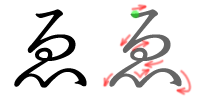We (kana)
| we | ||||
|---|---|---|---|---|
| ||||
| transliteration | e, we | |||
| hiragana origin | 恵 | |||
| katakana origin | 恵 | |||
| kana gojūon | ||||||||||||||||||||||||||||||||||||||||||||||||||
|---|---|---|---|---|---|---|---|---|---|---|---|---|---|---|---|---|---|---|---|---|---|---|---|---|---|---|---|---|---|---|---|---|---|---|---|---|---|---|---|---|---|---|---|---|---|---|---|---|---|---|
|
||||||||||||||||||||||||||||||||||||||||||||||||||
ゑ, in hiragana, or ヱ in katakana, is a nearly obsolete Japanese kana.
It is presumed that ゑ represented [we]. It is thought that, after ゑ and え came to denote the same pronunciation as イェ [je] in the Kamakura period, they came to be pronounced as the modern エ [e]; there is also the view that the pronunciation difference between the two kana remained until the Taishō period.
Along with the kana for wi (ゐ in hiragana, ヰ in katakana), this kana became obsolete in 1946 for Japanese, and is now rare in everyday usage; in onomatopoeia or foreign words, the katakana form ウェ (we) is preferred (as, ウェスト for "west"). One modern-day usage of this kana is in the name of the beer Yebisu, which is actually pronounced "Ebisu", and is occasionally written "ヱビス" or "ゑびす". The Japanese title of the Rebuild of Evangelion series is Evangelion: New Theatrical Edition (ヱヴァンゲリヲン新劇場版 Evangerion Shin Gekijōban). Katakana ヱ is sometimes written with a dakuten, ヹ, to represent a /ve/ sound in foreign words; however, most IMEs lack a convenient way to write this. The combination ヴェ is far more commonly used.
Hiragana ゑ is still used in several Okinawan orthographies for the syllable /we/. In the Ryukyu University system, ゑ is also combined with a small ぃ, ゑぃ/ヱィ, to represent the sound /wi/. Katakana ヱ is used in Ainu for /we/.
Stroke order


Other representations
| Character | ゑ | ヱ | ||
|---|---|---|---|---|
| Unicode name | HIRAGANA LETTER WE | KATAKANA LETTER WE | ||
| Encodings | decimal | hex | decimal | hex |
| Unicode | 12433 | U+3091 | 12529 | U+30F1 |
| UTF-8 | 227 130 145 | E3 82 91 | 227 131 177 | E3 83 B1 |
| Numeric character reference | ゑ | ゑ | ヱ | ヱ |
| Shift JIS | 130 239 | 82 EF | 131 145 | 83 91 |
- Braille
| ゑ / ヱ in Japanese Braille | |||
|---|---|---|---|
| ゑ / ヱ we | ヹ ve | ゑい / ヱー wē/wei | ヹー vē/vei |
| | | ||
![]()
![]()
![]()
See also
| Look up ゑ or ヱ in Wiktionary, the free dictionary. |

